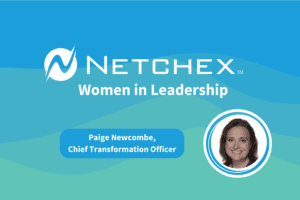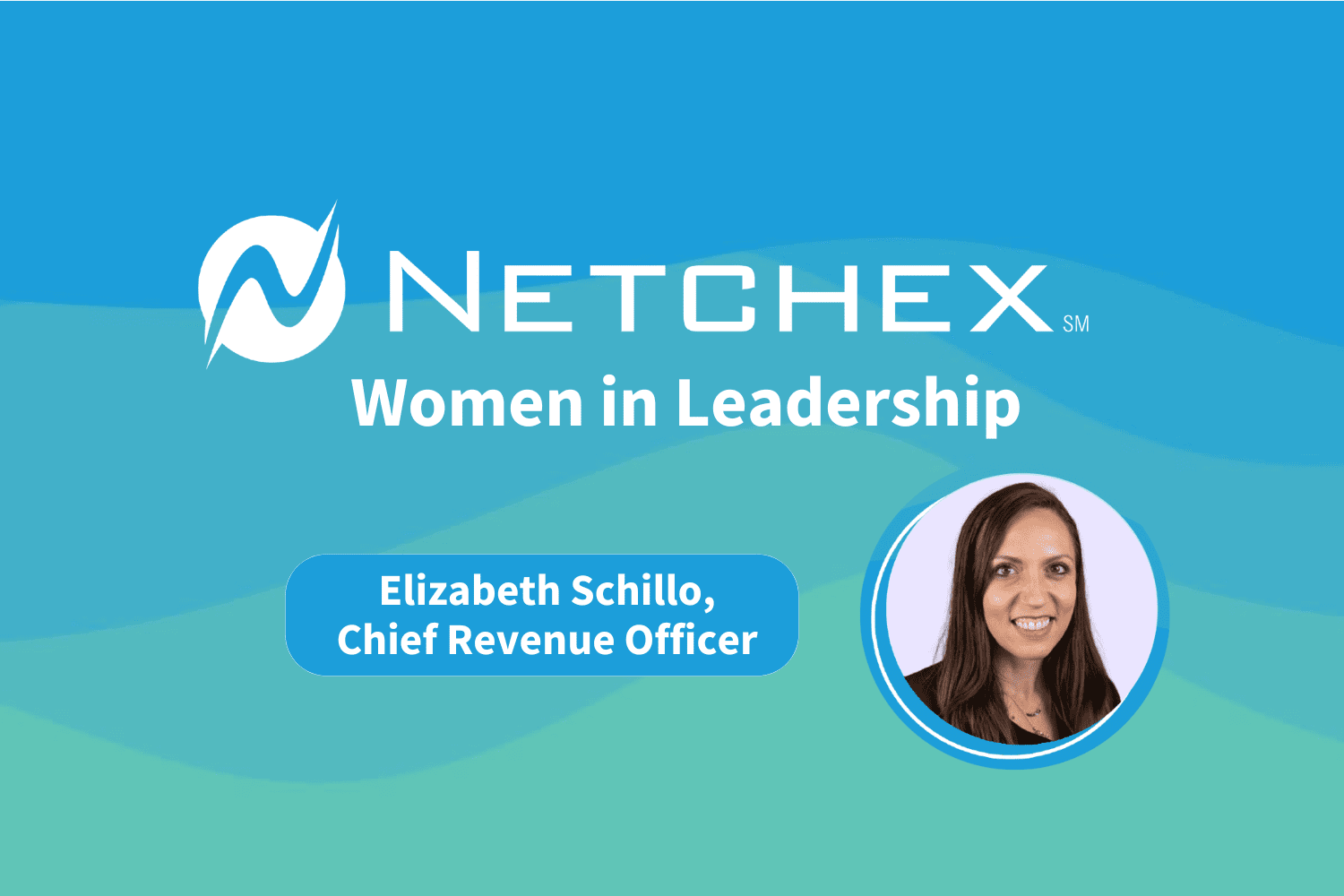Share
March is Women’s History Month. To mark this occasion, the Netchex Diversity, Equity, & Inclusion Council is honoring the many powerful women in leadership at Netchex who keep the ship afloat.

In our Netchex Women in Leadership series, we’ll hear from our executives and vice presidents about their career journeys, challenges, inspirations, and advice to others.
Next up is Elizabeth Schillo, Netchex’s Chief Revenue Officer. We talked to her about her career journey, her leadership style, and the importance of mentorships.
Tell us a bit more about your career journey thus far.
I had kind of a non-traditional journey… and then a very traditional one. I went to college and graduate school to be a therapist. While I was in grad school, I worked in a commission retail environment and I made enough money to be able to pay for school and pay my bills. So, I was like, “Oh, I should explore sales. This seems like something that I could do where I help to drive outcomes.” And I’ve been with Netchex since 2020.

Is this your first executive role?
It’s my first C-level title. My last four jobs were working with boards and reporting to either the President or CEO.
What are the specific challenges that exist at that level? And what kind of advice might you give to somebody who’s moving from an existing leadership role to one on that next level?
Everybody has different problems. Your problems just expand or contract based on what your role is. I think one of the things that’s most important in any role—especially an executive role where you are casting a vision for everyone around you—is being aligned on what you’re doing, how you’re doing it, why you’re doing it, and when you’re doing it.
There are very few companies that have bad strategies, but there are lots of companies that have bad executions. So, I think, as you step into a C-level role, being able to do task division that everyone can understand and buy into is critical. To be able to say, “Hey, listen, we’re doing X, we’re doing it this way, we’re doing it for these reasons, and we’re doing it over this period of time helps to create buy-in and build a culture where people believe they’re part of something that really matters.
That might actually have been a bit of the answer kind of to my next question: how would you describe your leadership style and what values guide your leadership decisions?
A lot is creating clarity. I think most people don’t do their best work when they’re not clear on what they need to do, or they’re overwhelmed by it. I’m very goal-focused and very metric-focused.
I am extremely hands on—probably sometimes more than I should be. I think empowering people is actually an area that I’m really focusing on stepping back and allowing them to own. I think people do their best work when they believe in what they’re doing. And I really focus on creating a sense of belief, and then, driving towards results.
What kind of challenges have you encountered as a woman in leadership? Does having female mentors help with those challenges?
It’s easy, as a woman, to hope that someone will see me, take an interest, ask what my goals are, and it will magically come to life. And that, I think, is very rare, just because most of us think about ourselves more than we think about other people.
I specifically sought out two mentors that were women because I wanted help in understanding how to be genuinely myself and create success in a very male-driven world and male-driven industry.
Is there like any advice you would give to women aspiring to be in leadership positions within our industry?
There’s tons, but I’m going to try and narrow it down to two buckets.
The first one is: be very clear about why you want to be a leader. Because it sounds cool, but the reality is, nobody cares about my title or wants to do what I say. They want to grow their own careers, grow their own lives, grow their own money. I am a conduit that gets to help them on their journey. So, if you are very motivated by watching other people create success, you will like being a leader. If you are very motivated by creating your own success, being a leader will probably feel kind of clunky and weighty to you.
I think the second piece is to surround yourself with a good team. As women, we tend to be somewhat perfectionistic over-thinkers. That is valuable to a point, and then it’ll break you because it can’t scale. Surrounding yourself with a team that can own the key pieces, especially where you may not be as strong, helps create a strong trajectory across the company.
To switch gears a little bit: balancing a leadership role with your personal life. How do you create that work-life balance for yourself?
I struggle with this—to be very candid. I have a business coach that I have used to help navigate some of this. She refers to it as: you’re not creating work-life balance, you’re creating work-life harmony. And so, in this harmony, some days the work wins and some days being a mom wins, some days being a wife wins, and some days it’s a different role. But you are creating a harmonious life for the things that matter to you. But every day—or sometimes every hour—one of them will have to take the forefront over the other one. So, I think back to what I said about mentoring and being really clear on your goals.
I think it’s really important in your personal life, too. To me, my professional life has been a large definer of my career, and it is so personal that it feels like it’s part of my personal life. I have two kids. They will be my kids way longer than I will work at any company. I’m married. I will be married way longer than I will work at any company. Literally every day of my life, I’m re-negotiating what that means to me and figuring it out. How do I live today in that harmony, which might be different than a year ago or a year from now?
Is there anything you do to help promote that for your employees? What can you do to help encourage or to promote that work-life harmony with your team?
I’m probably actually better at it for other people than I am for myself. One of the things that we try to put a lot of focus on, especially in a sales role that’s quota carrying, is you have freedom from when you have to hit a certain point. So, not your first day, but when you have hit a certain point and you’ve been here for a year. You’ve won Presidents Club. You’ve been promoted. We are focusing on freedom from process, not results.
Switching gears again to diversity and inclusion. How do you promote diversity within our organization? And why is it important to you?
I think it is really important to intentionally seek out people who have different perspectives. In some areas, that’s easy to do: geographically, gender, years of experience, and types of experience. You’ll get diversity. But I think it’s really important to seek out people who have different perspectives. And I think many companies are good at that.
I think, where diversity can really take flight and be meaningful, is making sure that those perspectives have a voice. It’s great if I have a different perspective than five other people in a room. Championing diversity. To be discussed and valued and appreciated day-to-day. For people to be open to other thought processes, and not just tolerant, but curious about experiences that don’t mirror their own
To wrap this up, are there any upcoming projects or initiatives you’re working on and are excited about?
Since I’ve been here, we have always hired one profile of person. Meaning you come in at the same job, same base salary. You make it, or you don’t. When you look at our competitors, they hire a variety of roles and levels and tiers— so that is something that we are testing.
We’re also intentionally targeting people who come from companies that are not household names. The Netchex name is not a household name. You have to be used to articulating your value, and then explaining what Netchex does.
I’m really excited about this opportunity for us to be more diversified across the experience levels of people we hire, the thoughts that they bring to the role, and the structures that they can bring to the role. I think that’s a huge opportunity.
Previous installments of the Women in Leadership series:
Discover how your company can empower women in the workplace from Netchex’s women in leadership:
- 10 Substantial Ways to Empower Women in the Workplace
- Addressing Gender Inclusivity in the Modern Workplace
- How Can HR Help Support and Retain Working Mothers?
Industry news & tips sent straight to your inbox!
Enter your email below to subscribe to industry news, product updates, and tips.
Related articles

Netchex Founder-CEO Shifts Role and Welcomes New CEO

Netchex Women in Leadership: Paige Newcombe, Chief Transformation Officer

Netchex Women in Leadership: Kelly Kennedy, VP of Finance

